Overview
The article presents ten essential product management software tools that startups can leverage to enhance their operations and productivity. Each tool, from Casy's task automation to Wrike's advanced project management features, is showcased for its unique capabilities designed to streamline workflows, improve collaboration, and ultimately assist startups in overcoming their growth challenges. By utilizing these tools, startup founders can effectively navigate the complexities of their journey, fostering an environment of efficiency and innovation.
Introduction
In a rapidly evolving business landscape, startups are increasingly turning to product management software to streamline operations and enhance productivity. These tools not only facilitate task management and collaboration but also empower teams to navigate the complexities of product development with agility and precision. As the demand for effective management solutions grows, the challenge lies in identifying which software can truly elevate a startup's performance.
What essential tools can transform the way new businesses operate and thrive in today's competitive environment?
Casy: Automate Task Management and Enhance Productivity
Casy is a cutting-edge management tool that revolutionizes task handling through seamless integration with chat platforms like Slack and Telegram. By automatically gathering essential details from discussions, Casy generates tasks and establishes deadlines without the need for manual input. This capability enables teams to concentrate on their core activities while significantly reducing administrative burdens.
With features such as automated task creation, planning, and built-in methodologies like OKRs and the Eisenhower Matrix, Casy functions as a versatile product management software that adapts effortlessly to diverse workflows. This automation not only enhances productivity—groups utilizing product management software with communication capabilities report a 52% improvement in group communication—but also empowers new businesses and agile organizations to operate more effectively, addressing the growing demand for streamlined management solutions.
As organizations increasingly recognize the value of automation, with 81% of decision-makers aware of its benefits and 75% viewing workflow automation as a substantial competitive advantage, tools like Casy are poised to drive significant improvements in group performance and project outcomes. Furthermore, with 54% of enterprises anticipating a return on investment within 12 months of implementation, Casy presents a compelling case for new ventures seeking to enhance their operational efficiency.
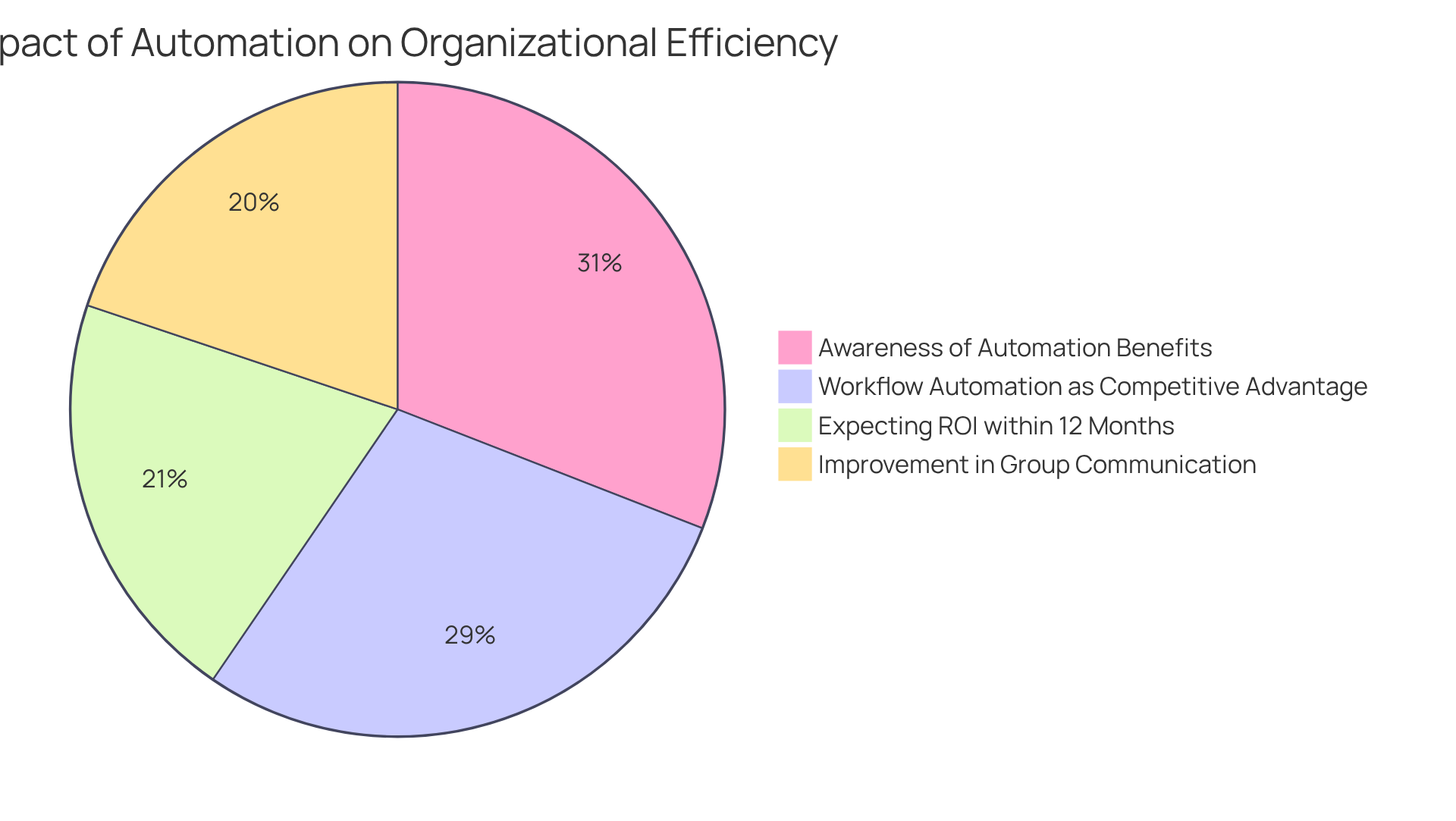
Aha!: Powerful Roadmapping for Strategic Product Planning
Aha! emerges as a formidable roadmapping tool, specifically crafted to empower product teams in defining their strategies and visualizing product plans. Its features facilitate idea capture, initiative prioritization, and the alignment of product development with overarching business goals. Particularly advantageous for new businesses, Aha! plays a crucial role in enhancing strategic planning. In 2025, it is projected that over 70% of startups will utilize roadmapping tools to streamline their strategic planning processes. This statistic underscores the importance of such tools in maintaining focus on strategic objectives while remaining agile in response to market dynamics.
Experts in product management software assert that effective roadmapping is essential for aligning product development with business goals. Industry leaders emphasize that a well-structured roadmap not only clarifies priorities but also fosters communication across teams, ensuring that all members work towards common objectives. Real-world examples illustrate how new businesses leverage Aha! to enhance their strategic planning. For instance, a technology company successfully utilized Aha! to pivot its product offerings based on customer feedback, resulting in a remarkable 30% increase in user engagement.
By integrating Aha! into their processes, new ventures can adeptly navigate the complexities of product oversight. This integration guarantees that their strategies are articulated clearly while remaining flexible to the continuously evolving market environment. Are you ready to harness the power of Aha! and elevate your startup's strategic planning?
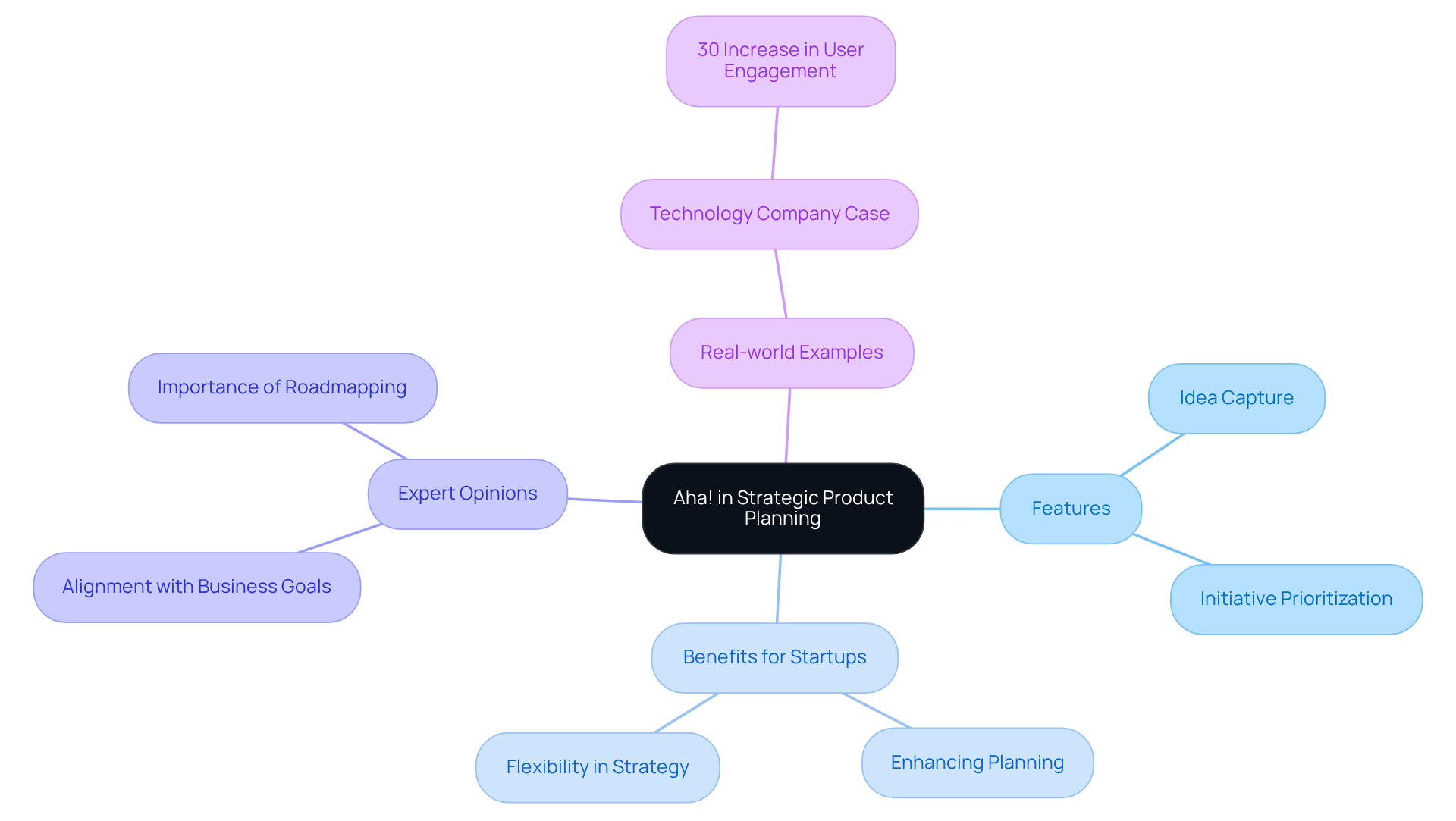
Jira: Agile Project Management for Development Teams
Jira, developed by Atlassian, is a powerful product management software tailored for agile teams, particularly within the software development sector. Its extensive features for sprint planning, issue tracking, and real-time collaboration enable startups to optimize their workflows effectively. With a remarkable 93% of Agile organizations reporting improved operational performance and customer satisfaction, Jira's capabilities are crucial for enhancing team productivity and engagement.
Startups leveraging Jira can adapt their processes as they scale, taking advantage of its inherent flexibility and scalability. According to the 17th Annual State of Agile Report, Engineering and R&D teams represent the fastest-growing segment of Agile practitioners, accounting for 48% of the total, underscoring the tool's importance in fast-paced environments.
Real-world examples illustrate Jira's impact: startups utilizing its agile management features have experienced significant improvements in task visibility and collaboration. For example, teams can effortlessly monitor progress through the Sprint Report, which offers an immediate overview of achievements and priorities, thus facilitating more informed decision-making.
Looking ahead to 2025, the integration of AI work breakdown features in Jira will further enhance its functionality, suggesting ways to decompose epics into manageable tasks, thereby improving execution. This evolution aligns with the growing trend of Agile adoption across various sectors, as evidenced by 86% of marketers planning to transition to Agile methodologies, indicating a broader shift towards more responsive and efficient practices.
In conclusion, product management software such as Jira not only assists software development startups in managing their projects but also cultivates a culture of continuous improvement and adaptability, which is vital for thriving in today's competitive landscape.
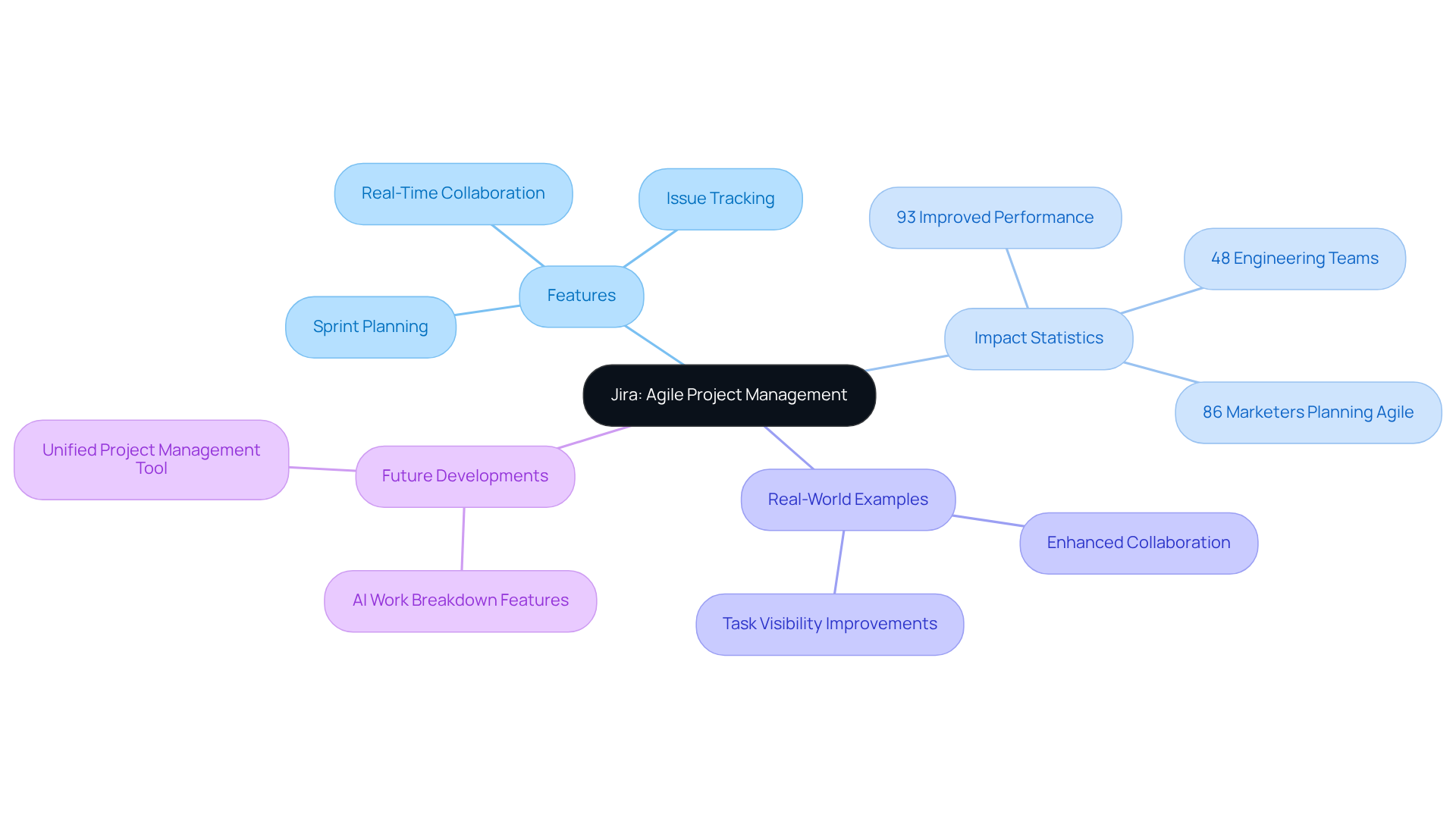
Craft.io: End-to-End Product Management Solution
Craft.io is a comprehensive end-to-end product oversight platform designed to empower teams in managing the entire product lifecycle with efficiency. It provides essential tools for roadmapping, prioritization, and collaboration, enabling product managers to align their teams and optimize workflows seamlessly with product management software. With its intuitive interface and robust features, Craft.io stands out as an ideal choice for startups looking to enhance their product oversight processes.
By fostering improved communication and coordination among team members, Craft.io significantly enhances efficiency and productivity, allowing startups to focus on innovation and responsiveness to market demands. Have you ever wondered how other startups streamline their product lifecycle? Real-world examples demonstrate how they leverage Craft.io to refine their processes, showcasing its effectiveness in driving successful outcomes.
As the demand for integrated product management software continues to surge, Craft.io remains at the forefront, delivering valuable insights and statistics that highlight the critical role of collaboration in achieving product success. Are you ready to elevate your product oversight? Explore how Craft.io can transform your approach and lead your startup to greater achievements.
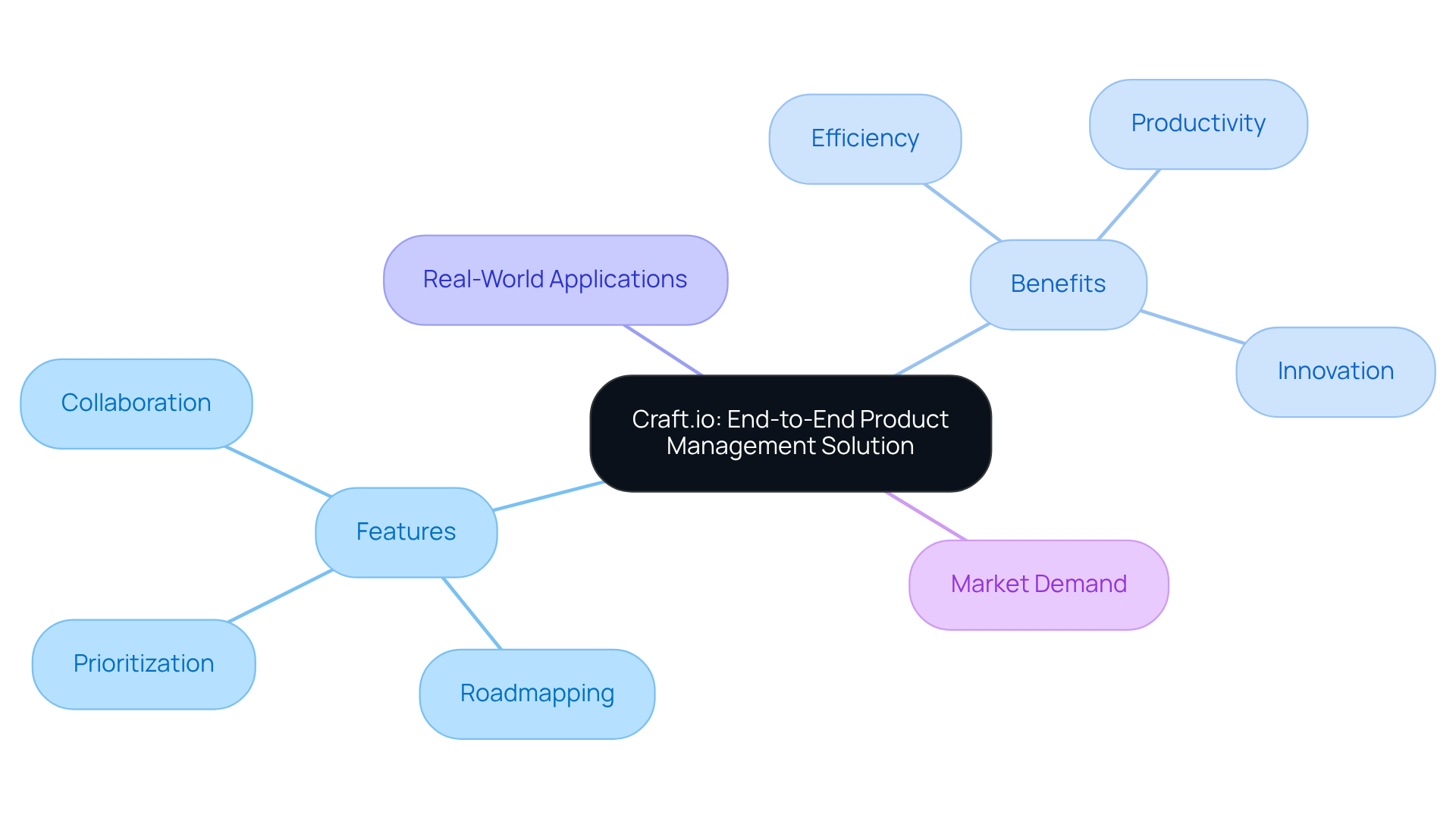
Productboard: Prioritize Features with User Insights
Productboard is an essential product management software that empowers teams to prioritize features based on user insights. By enabling product managers to collect feedback and visualize the alignment of features with business objectives, Productboard fosters informed decision-making in product development. For new businesses, this capability is critical; it ensures that products not only meet customer expectations but also adapt to evolving market demands.
As we look ahead to 2025, the integration of user feedback into product oversight processes has become increasingly vital. Studies reveal that companies leveraging customer insights can see a remarkable 25-30% boost in retention rates. Moreover, 65% of product managers identify roadmapping as the most challenging aspect of their role, highlighting the necessity for product management software such as Productboard that streamline prioritization and decision-making.
Startups utilizing product management software such as Productboard have reported enhanced clarity in their product roadmaps, enabling them to concentrate on features that resonate most with their users. This strategic prioritization accelerates product development and significantly improves the likelihood of market success. Consequently, product management software such as Productboard emerges as an indispensable resource for any new business striving to excel in a competitive landscape.
As Jeff Bezos aptly notes, maintaining a customer-focused approach allows companies to lead rather than react. This reinforces the critical role of user insights in effective product development. Are you ready to transform your product strategy and thrive in today's dynamic market?
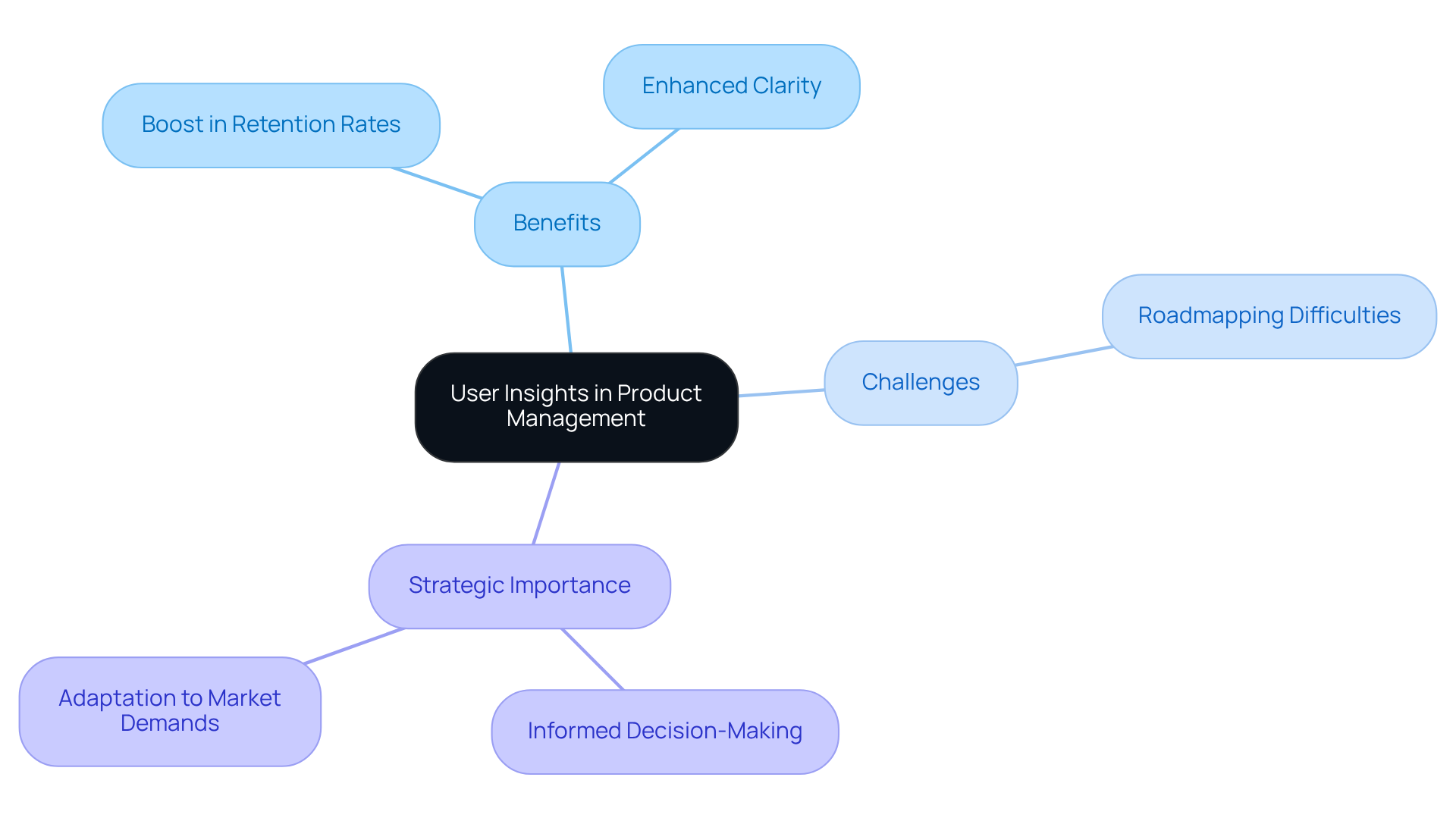
Trello: Visual Task Management for Team Collaboration
Trello stands out as a visual task management tool, employing a card-based interface that empowers groups to arrange their tasks and projects with remarkable efficiency. This method proves especially beneficial for startups, which often seek straightforward yet effective strategies for managing workflows. The inherent flexibility of Trello allows teams to customize boards, lists, and cards according to their unique needs, significantly boosting collaboration and productivity.
Organizations that leverage visual task organization tools like Trello report an impressive 92% success rate in achieving their objectives. Furthermore, those adhering to established practices waste 28 times less money than their counterparts who do not, underscoring the financial advantages of effective oversight. Consider this: how much could your startup save by optimizing task management?
Real-world examples illustrate that new businesses utilizing Trello experience improved coordination and task visibility, leading to a notable increase in completion rates. Moreover, Trello's latest features, such as the 'Inbox' column for capturing tasks and integration with Google Calendar, enhance its functionality even further.
As the demand for efficient task coordination solutions continues to rise, Trello's product management software, with its visual task organization capabilities, remains essential for fostering collaboration and achieving organizational goals. Are you ready to elevate your startup's productivity with Trello?
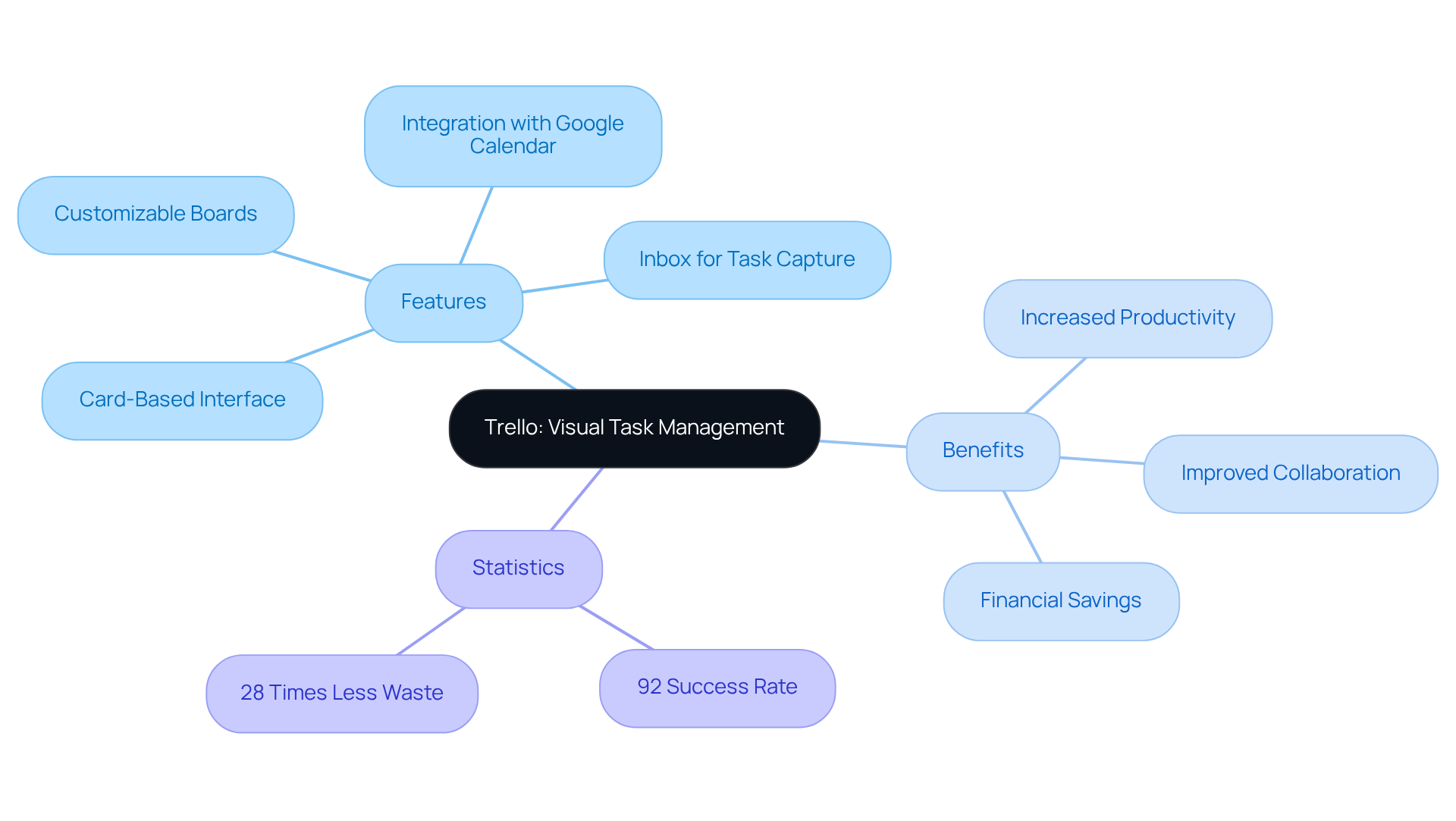
Monday.com: Customizable Work Operating System for Startups
Monday.com serves as a highly adaptable work operating system, empowering new businesses to create workflows tailored to their unique needs. With a robust suite of features—including task organization, collaboration tools, and automation capabilities—it enables teams to streamline processes with remarkable efficiency. This adaptability is crucial for startups, as it equips them to adjust strategies in response to evolving demands.
Statistics reveal that 77% of high-performing teams utilize effective task coordination software, underscoring the importance of customized solutions in enhancing productivity. Moreover, organizations that implement adaptable workflows report significant improvements in efficiency and accountability, with many experiencing a reduction in resource waste stemming from ineffective practices.
Consider real-world examples where new businesses leverage Monday.com to optimize task management. Companies have successfully integrated automated task creation and planning features, conserving time while enhancing team collaboration. As startups navigate the complexities of growth, the ability to swiftly adapt workflows emerges as an invaluable asset.
Experts assert that embracing customizable product management software like Monday.com can yield substantial productivity gains. By enabling teams to concentrate on strategic objectives rather than routine tasks, these tools cultivate an environment conducive to innovation. Moving into 2025, the focus on tailored workflows will intensify, positioning platforms like Monday.com as essential for startups aspiring to scale efficiently.
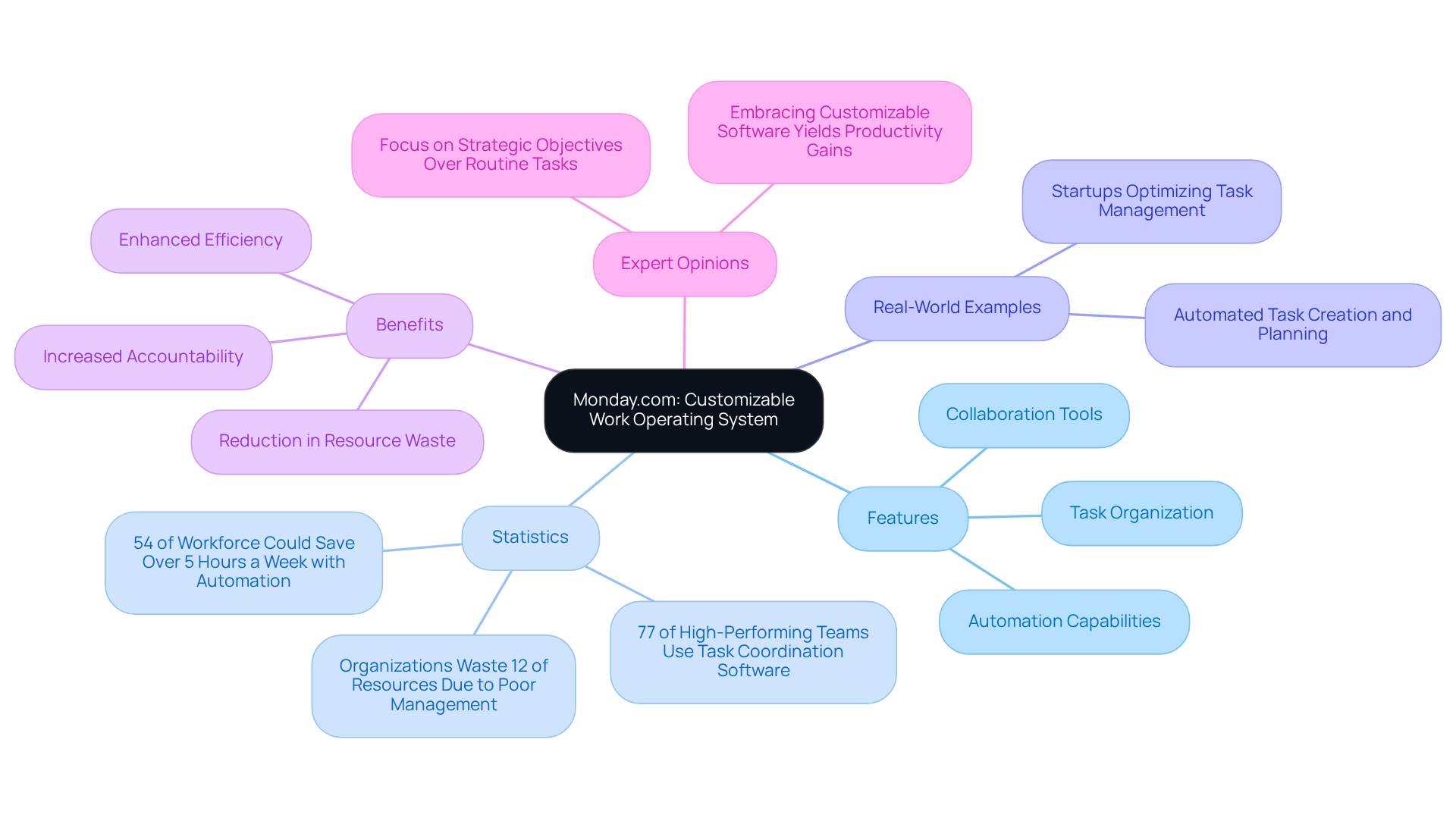
Asana: User-Friendly Task Tracking for Project Management
Asana stands out as a premier product management software for organizing tasks, with an intuitive interface that simplifies activity tracking and collaboration. With functionalities such as timelines, Kanban boards, and task assignments, product management software empowers teams to enhance their organization and focus. Have you considered how Asana can refine your workflow processes? Startups can leverage this powerful tool to significantly boost group productivity, transforming their operational efficiency.
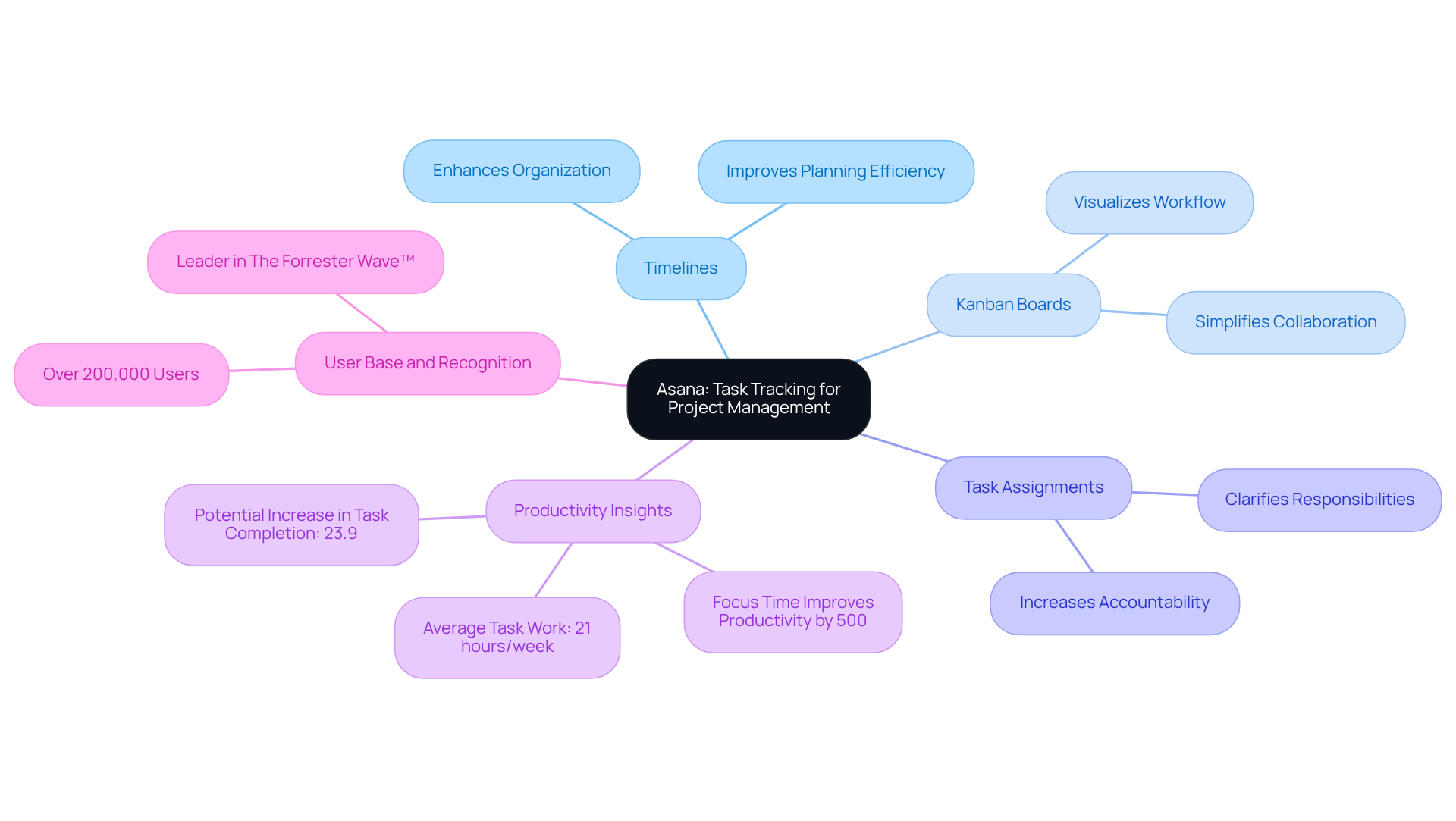
ClickUp: All-in-One Project Management Platform
Casy is an innovative tool for coordinating tasks, seamlessly integrating with popular chat platforms like Slack and Telegram. It automatically captures key information from conversations, creating assignments, setting deadlines, and updating documents. This distinct ability empowers new ventures to optimize their processes and reduce administrative burdens. Consequently, teams can focus on innovation and expansion.
With the product management software sector for task management expected to grow to $15 billion by 2030, Casy emerges as a vital resource for startups aiming to enhance efficiency. By automating task creation and minimizing manual updates, Casy fosters collaboration and ensures that team efforts align with strategic objectives.
As companies increasingly recognize the essential role of product management software, Casy's extensive features position it as an indispensable asset for new businesses navigating the complexities of task management. Are you ready to streamline your operations and elevate your team's productivity? Embrace Casy and transform the way your startup manages tasks.
Wrike: Advanced Project Management for Complex Workflows
Wrike stands out as a sophisticated tool designed to tackle the complexities of managing multiple workflows, making it an ideal choice for startups. With features such as:
- Gantt charts
- Time tracking
- Resource coordination
teams can visualize timelines and allocate resources with precision. Have you considered how such tools could enhance your productivity? Startups leveraging Wrike can significantly boost their efficiency; statistics reveal that:
- 59% of initiatives using formal methodologies are completed on time, in contrast to just 43% of those that do not.
- Organizations with high-performing PMOs are 13% more likely to employ product management software for project oversight, underscoring the importance of such platforms like Wrike for effective coordination.
- 64% of projects that are completed on schedule and within budget are deemed successful, highlighting the critical role of Wrike's features in fostering seamless collaboration among teams.
As startups face the challenges of 2025, embracing product management software such as Wrike's advanced project management capabilities can lead to enhanced outcomes and a more streamlined approach to navigating complex workflows.
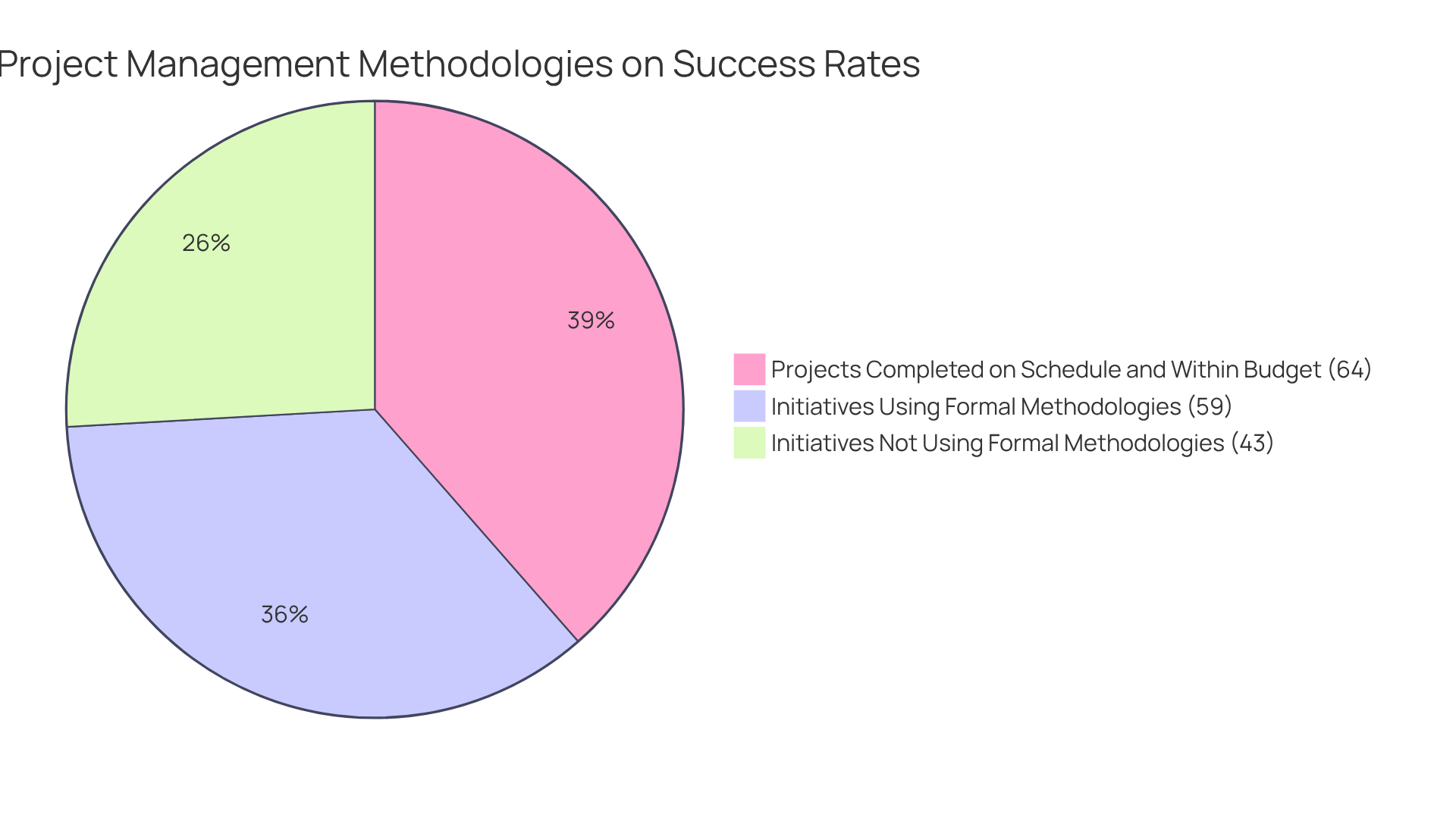
Conclusion
In the competitive realm of startups, selecting the right product management software is crucial for driving efficiency and fostering innovation. The tools discussed—Casy, Aha!, Jira, Craft.io, Productboard, Trello, Monday.com, Asana, ClickUp, and Wrike—each offer unique features designed to streamline processes, enhance collaboration, and align product development with strategic goals. These platforms not only aid in task management but also empower teams to adapt swiftly to market demands, ensuring that startups remain agile and responsive.
Key insights reveal that automation, user feedback integration, and customizable workflows are significant factors contributing to improved productivity and project outcomes. For instance:
- Casy automates task creation
- Aha! enhances strategic planning
- Trello’s visual task management fosters team collaboration
Furthermore, as the demand for effective product management solutions continues to rise, utilizing these tools can lead to substantial competitive advantages. Many startups report increased efficiency and higher success rates in project completion.
Ultimately, the choice of product management software can profoundly impact a startup's trajectory. By embracing these innovative tools, new businesses can streamline operations and cultivate a culture of continuous improvement and adaptability. As the landscape evolves, startups are encouraged to invest in these essential resources to enhance productivity and drive sustainable growth in the years to come.
Frequently Asked Questions
What is Casy and how does it enhance productivity?
Casy is a task management tool that integrates with chat platforms like Slack and Telegram to automate task creation and deadline establishment by gathering details from discussions. This reduces administrative burdens and allows teams to focus on their core activities.
What features does Casy offer?
Casy offers automated task creation, planning, and built-in methodologies such as OKRs and the Eisenhower Matrix, making it a versatile product management software that adapts to various workflows.
How does Casy impact group communication?
Groups using product management software with communication capabilities, like Casy, report a 52% improvement in group communication.
What is Aha! and what purpose does it serve?
Aha! is a roadmapping tool designed to help product teams define strategies and visualize product plans, facilitating idea capture, initiative prioritization, and alignment of product development with business goals.
Why is roadmapping important for startups?
Roadmapping helps startups maintain focus on strategic objectives while remaining agile in response to market changes. It is projected that over 70% of startups will use roadmapping tools by 2025 for effective strategic planning.
How does Aha! contribute to strategic planning?
Aha! clarifies priorities and fosters communication across teams, ensuring alignment towards common objectives. Real-world examples show startups using Aha! to pivot their product offerings based on customer feedback, leading to increased user engagement.
What is Jira and who is it designed for?
Jira is a product management software developed by Atlassian, tailored for agile teams, particularly in the software development sector, focusing on sprint planning, issue tracking, and real-time collaboration.
What benefits do startups experience using Jira?
Startups using Jira report improved operational performance and customer satisfaction, with 93% of Agile organizations noting enhanced productivity and engagement.
How does Jira support agile methodologies?
Jira offers flexibility and scalability, allowing startups to adapt their processes as they grow. It provides tools like the Sprint Report for monitoring progress and facilitating informed decision-making.
What future enhancements are expected for Jira?
By 2025, Jira is expected to integrate AI work breakdown features, which will help users decompose epics into manageable tasks, further improving execution and aligning with the trend of Agile adoption across sectors.




